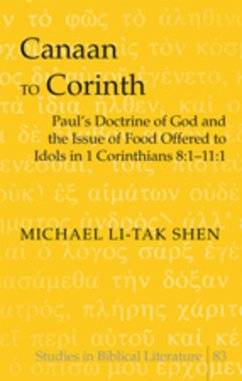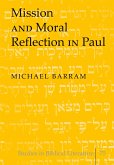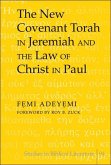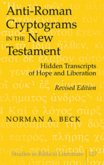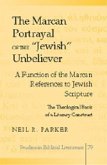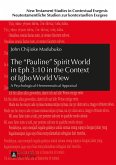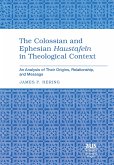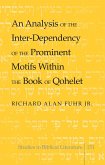Canaan to Corinth raises important questions dealing with the nature of food and its relationship to idolatry in 1 Corinthians 8:1-11:1. What is the nature of food sacrificed to idols? Are Christians allowed to eat it? The Corinthians asked Paul, and he searched the Old Testament for his answer in the doctrine of God. This shed light on the idea of idolatry as a wrongful exchange of God for things in creation. Moses faced idolatry in Canaan and became the paradigm for Paul to deal with idolatry in Corinth. This examination clarifies the nature of the Apostolic Decree and the difference between «unclean food» and «idol food» and further suggests the hypothesis that Paul did not teach or practice the conscious consumption of food known to have been sacrificed to idols.
«'Canaan to Corinth' is a careful, up-to-date study that takes one through the interpretive and theological steps to sort out the advice Paul gives about how to be faithful to God, exercise the freedom Scripture does give to Christians, and yet appreciate the real danger idolatry brings to one's walk with God. Michael Li-Tak Shen takes us through the passages, views, and debates a step at a time, as well as treating the relevant historical background. It is a solid guide to the issues of the text as well as a gateway to proper application. There is much to learn here.» (Darrell L. Bock, Research Professor of New Testament Studies, Dallas Theological Seminary)
«Michael Li-Tak Shen carefully examines the biblical view of God's absolute uniqueness, and argues that the biblical texts are consistent in their prohibition of idolatry and its paraphernalia in whatever form - a helpful point in similar pastoral situations today in a world of idols, ideologies, addictions, and runaway consumerism. The high view of the absolute nature of God warns against lax and mistaken notions of so-called Christian freedom.» (Robert Solomon, Bishop, the Methodist Church in Singapore)
«In light of all the sociological works done on the topic of New Testament food issues, Michael Li-Tak Shen's 'Canaan to Corinth' is a change of direction. His work brings back the person of God to the forefront. Shen works in the traditional Chinese culture where food and religion create realworld tension. By finding a solution beyond culture, Shen features Paul's main theological concern that was rooted deep in the Hebrew Bible.» (Sam Tsang, Associate Professor of New Testament and Preaching, Hong Kong Baptist Theological Seminary)
«Michael Li-Tak Shen is admirably positioned to address the issue of food offered to idols for two reasons. Firstly, as someone effectively bi-lingual in Chinese and English, he brings to the on-going study a uniquely helpful Asian perspective. Secondly, as someone experienced in both pastoral ministry and theological education, he combines the meaning of the biblical texts with an appreciation of its context in real-life situations.» (David Wong, Senior Pastor, Zion Bible-Presbyterian Church, Adjunct Faculty, Biblical Graduate School of Theology, Singapore)
«Michael Li-Tak Shen carefully examines the biblical view of God's absolute uniqueness, and argues that the biblical texts are consistent in their prohibition of idolatry and its paraphernalia in whatever form - a helpful point in similar pastoral situations today in a world of idols, ideologies, addictions, and runaway consumerism. The high view of the absolute nature of God warns against lax and mistaken notions of so-called Christian freedom.» (Robert Solomon, Bishop, the Methodist Church in Singapore)
«In light of all the sociological works done on the topic of New Testament food issues, Michael Li-Tak Shen's 'Canaan to Corinth' is a change of direction. His work brings back the person of God to the forefront. Shen works in the traditional Chinese culture where food and religion create realworld tension. By finding a solution beyond culture, Shen features Paul's main theological concern that was rooted deep in the Hebrew Bible.» (Sam Tsang, Associate Professor of New Testament and Preaching, Hong Kong Baptist Theological Seminary)
«Michael Li-Tak Shen is admirably positioned to address the issue of food offered to idols for two reasons. Firstly, as someone effectively bi-lingual in Chinese and English, he brings to the on-going study a uniquely helpful Asian perspective. Secondly, as someone experienced in both pastoral ministry and theological education, he combines the meaning of the biblical texts with an appreciation of its context in real-life situations.» (David Wong, Senior Pastor, Zion Bible-Presbyterian Church, Adjunct Faculty, Biblical Graduate School of Theology, Singapore)

